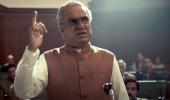'Elections and audience interest in specific movies are often independent factors.'

With the election season upon us, the spotlight has once again turned to politics, a perennial muse for the silver screen. In the realm of Indian cinema, a surge of political narratives has emerged.
Telugu cinema, in particular, has witnessed a flurry of biographical depictions of Andhra Pradesh Chief Minister Yeduguri Sandinti Jagan Mohan Reddy.

In the last three months alone, two back-to-back films, Yatra 2 and Vyuham, have delved into his life, with a third instalment, Sapatham, slated for release during the election season.
Ram Gopal Varma, director of Vyuham and its sequel Sapatham, cites the dramatic narrative of Reddy's journey as the primary inspiration for these two cinematic ventures.
Meanwhile, another recent Telugu release, Raajadhani Files, tackles the contentious issue of Andhra Pradesh's three-capital proposal, garnering attention and support from Opposition parties like the Telugu Desam Party.

In Bollywood, the landscape is no less politically charged, with a slew of releases and upcoming releases such as Swatantrya Veer Savarkar, Article 370, Bastar: The Naxal Story, Main Atal Hoon, Accident Or Conspiracy: Godhra, JNU: Jahangir National University (initially slated for an April 5 release, but delayed), The Sabarmati Report, (releases on May 3) and Razakar.
Despite the diversity of subjects, the box office reception for these films has been mixed, with most of them proving to be either duds or just about average performers. Article 370 was an exception.
It is estimated that these films released so far have collectively made Rs 150 crore to Rs 200 crore (Rs 1 billion to Rs 2 billion) -- with Article 370 garnering around Rs 109 crore (Rs 1.08 billion) and Savarkar Rs 23 crore (Rs 230 million) until now.

Another film in the genre released this year is the Hrithik Roshan-starrer Fighter, a fictionalised account that draws from the Pulwama attack and India's strikes across the border in Balakot.
"Such movies have a niche target audience, those who analyse news," says Varma.
"The majority wants entertainment. Any film dealing with political issues has a niche audience," he reiterates.
He emphasises that such movies often transcend the confines of traditional theatrical success, resonating more deeply with viewers attuned to political discourse and analysis, and hence "cannot be treated as regular movies".

Varma says he tracked Jagan Reddy's journey from the time of his father's death in a helicopter crash.
"At that young age, he (Reddy) went against the wishes of the high command, started his own party, and was then put in jail," says Varma.
"The whole thing is a dramatic achiever kind of story. That is what interested me primarily," he adds.

Sudipto Sen, director of Bastar: The Naxal Story, rebuffs the notion of his films being mere political jingoism, asserting that they aim to shed light on pressing social issues rather than espouse political ideologies.
Despite facing controversies, Sen's previous work, The Kerala Story, achieved commercial success.
"Content is king," says Sen. The Kerala Story came from real-life inspiration."
Bastar is a region plagued by daily violence and loss, he says. Naxalism, he adds, has resulted in the deaths of over 50,000 civilians and 15,000 soldiers across the nation.
"Addressing the profound suffering of the people in this area transcends mere politics," asserts Sen.

However, despite its critical subject matter, Bastar failed to replicate the commercial success of Sen's previous venture, The Kerala Story, which faced bans in states like Tamil Nadu, West Bengal, and Kerala.
"Controversy often propels a film's success, tapping into the human curiosity to engage with forbidden narratives," Sen says.
"While controversy may have contributed to its popularity, The Kerala Story resonated on a deeper emotional level," he insists.
"It cannot be dismissed as merely political or propagandist." The Kerala Story reportedly grossed about Rs 289 crore (Rs 2.89 billion) in 2023.

The box office performance of any film, including Savarkar and Bastar, ultimately depends on how well it resonates with viewers, says Sanjeev Kumar Bijli, executive director, PVR INOX.
"Elections and audience interest in specific movies are often independent factors," he maintains.
"While some films may spark conversations that align with current events, audience interest is primarily driven by factors like the film's genre, cast, and story," adds Bijli.
For producers like Anand Pandit, who is behind Savarkar, political dramas serve as a conduit for societal reflection and dialogue.
"They provide a platform for discussing and understanding these issues, and they can also inspire critical thinking and awareness among the audience," Pandit says.
"Political dramas often serve as a mirror to society, allowing people to see their own experiences and concerns portrayed on screen, which can be both validating and thought-provoking."

Politics on the silver screen
One of the early instances of political cinema in India was Kissa Kursi Ka, a satirical take on the Indira Gandhi government. The film was banned and its prints confiscated.
More recently, in 2019, ahead of the last general election, films such as The Accidental Prime Minister, depicting Dr Manmohan Singh's tenure, and Narendra Modi, chronicling the life of the current prime minister, hit the screens.
In Telugu cinema, too, 2019 witnessed a similar trend with movies like Yatra, which explored the life of the late Andhra Pradesh chief minister Y S Rajasekhara Reddy from the Congress, NTR: Mahanayakudu, which delved into the legacy of N T Rama Rao, and Lakshmi's NTR, which shed light on a family's internal power struggle.
Feature Presentation: Ashish Narsale/Rediff.com












 © 2025
© 2025